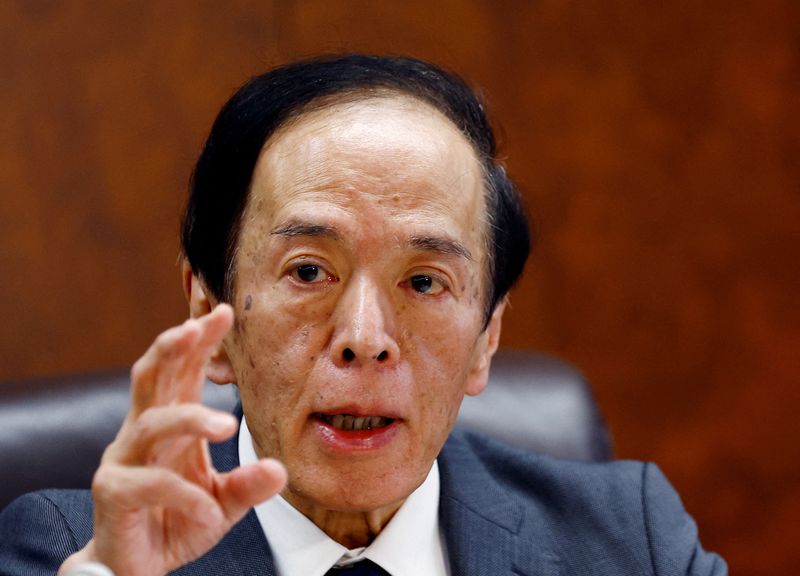By Leika Kihara
OSAKA (Reuters) -Bank of Japan Governor Kazuo Ueda said there was "very high uncertainty" over whether companies would continue raising prices and wages, stressing anew the bank's resolve to maintain ultra-loose monetary policy.
He also offered a cautious take on the overseas economic outlook, warning of the fallout from aggressive U.S. interest rate hikes and sluggish growth in the Chinese economy.
The key to the outlook for monetary policy is whether strong wage growth and consumption, rather than cost pressures from rising import costs, become the key driver of inflation, Ueda said.
"We're seeing some signs of change in corporate wage- and price-setting behaviour. But there is very high uncertainty on whether these changes will broaden," Ueda told business leaders in the western Japanese city of Osaka on Monday.
Under its yield curve control (YCC) policy, the BOJ guides short-term interest rates at -0.1% and caps the 10-year government bond yield around zero.
In a news conference after the meeting, Ueda said the BOJ could tweak YCC when the stable, sustained achievement of its 2% inflation target comes into sight.
But the BOJ had "no clear image in mind" yet on when and how it could ditch the yield cap or raise short-term interest rates.
"It will be a comprehensive judgement" assessing various factors including the wage outlook, as well as the strength of consumption and capital expenditure, he added.
The BOJ maintained ultra-low interest rates on Friday and its pledge to keep supporting the economy until inflation sustainably hits its target, dispelling market speculation that rising inflation would soon prod the bank to phase out its massive monetary stimulus.
Ueda told the meeting the BOJ was "not fully convinced" that wage hikes would keep accelerating, as many companies seemed undecided on their wage strategy for next year and beyond.
"The cost-push inflation we've seen so far hurts companies and households. That's why we are supporting demand and the broader economy with easy monetary policy," he added.
On the yen's recent falls, Ueda said the BOJ was keeping a close eye on their impact on economic and price developments.
The BOJ's ultra-loose policy has been blamed by some politicians as hurting households and retailers by weakening the yen, and pushing up raw material import costs.
In the past, a weak yen had drawn words of praise from business executives in Osaka, which is home to big exporters and manufacturers like Panasonic (OTC:PCRFY).

But executives who spoke at Monday's session with Ueda complained of the pain the weak yen was inflicting on smaller firms struggling to cope with rising raw material costs.
"We hope the BOJ will slowly and carefully move toward an exit from ultra-easy policy," Shingo Torii, head of the Osaka Chamber of Commerce and Industry, said in the meeting with Ueda.